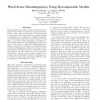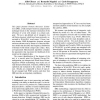26 search results - page 2 / 6 » Unsupervised Sense Disambiguation Using Bilingual Probabilis... |
ACL
1994
13 years 6 months ago
1994
Most probabilistic classi ers used for word-sense disambiguationhave either been based on onlyone contextual feature or have used a model that is simply assumed to characterize th...
LREC
2008
13 years 6 months ago
2008
Word Sense Disambiguation (WSD) is an intermediate task that serves as a means to an end defined by the application in which it is to be used. However, different applications have...
EMNLP
2004
13 years 6 months ago
2004
This paper presents Domain Relevance Estimation (DRE), a fully unsupervised text categorization technique based on the statistical estimation of the relevance of a text with respe...
COLING
2000
13 years 6 months ago
2000
In this paper, word sense dismnbiguation (WSD) accuracy achievable by a probabilistic classifier, using very milfimal training sets, is investigated. \Ve made the assuml)tiou that...
ACL
2009
13 years 2 months ago
2009
We investigate the task of unsupervised constituency parsing from bilingual parallel corpora. Our goal is to use bilingual cues to learn improved parsing models for each language ...


